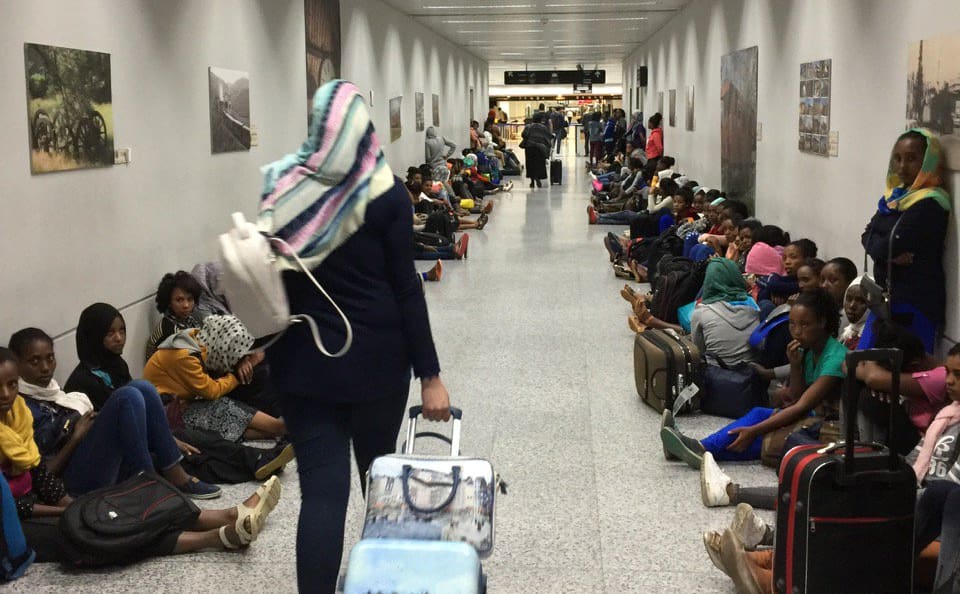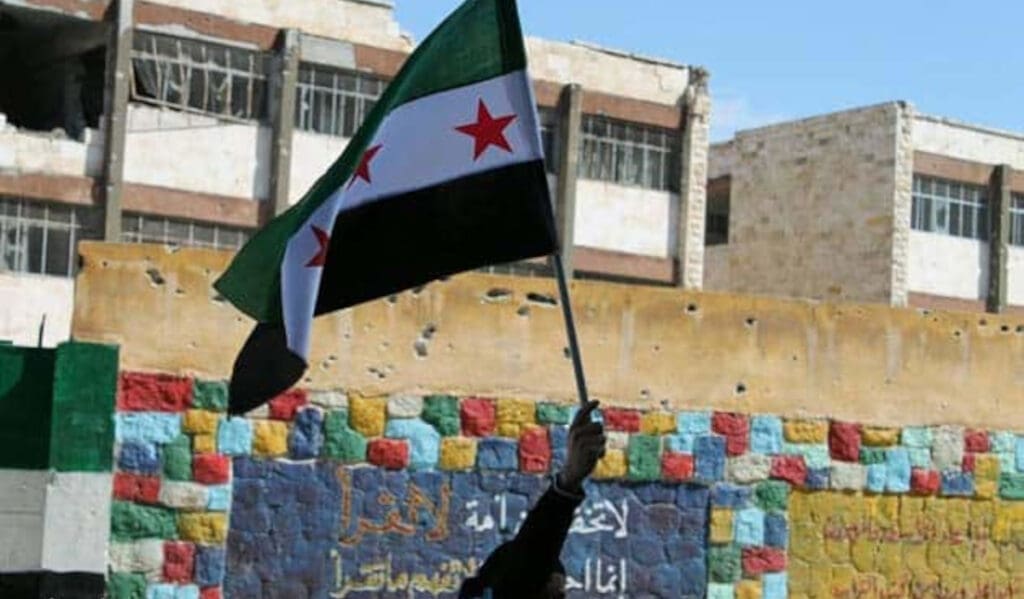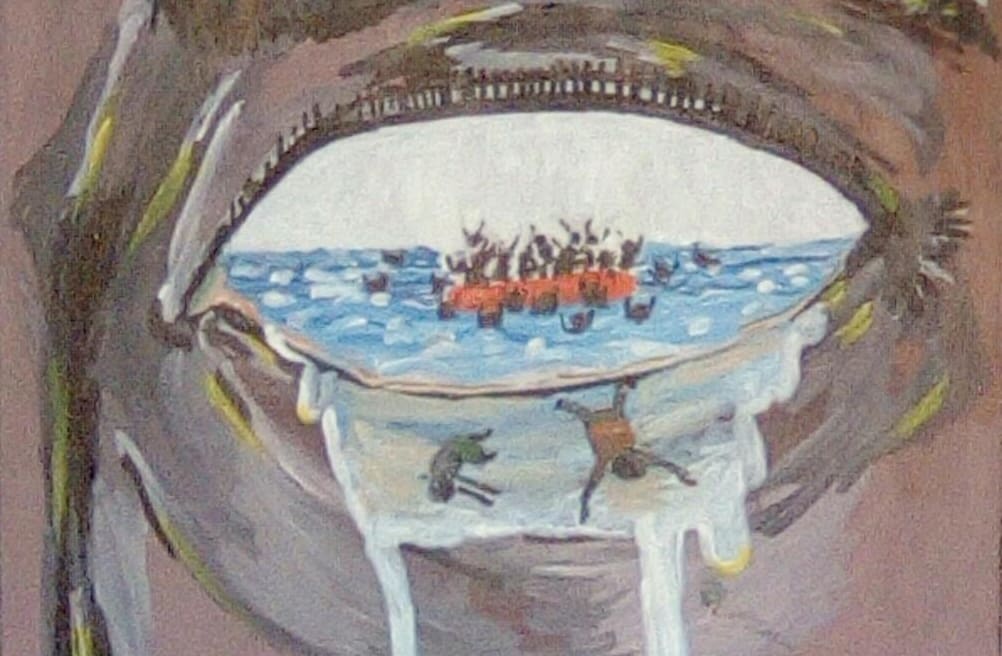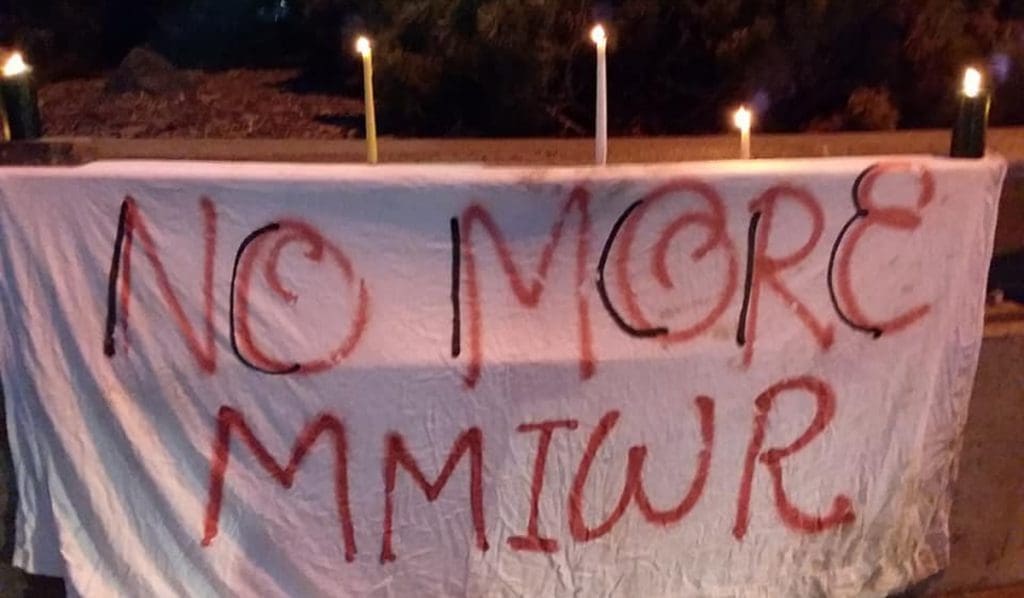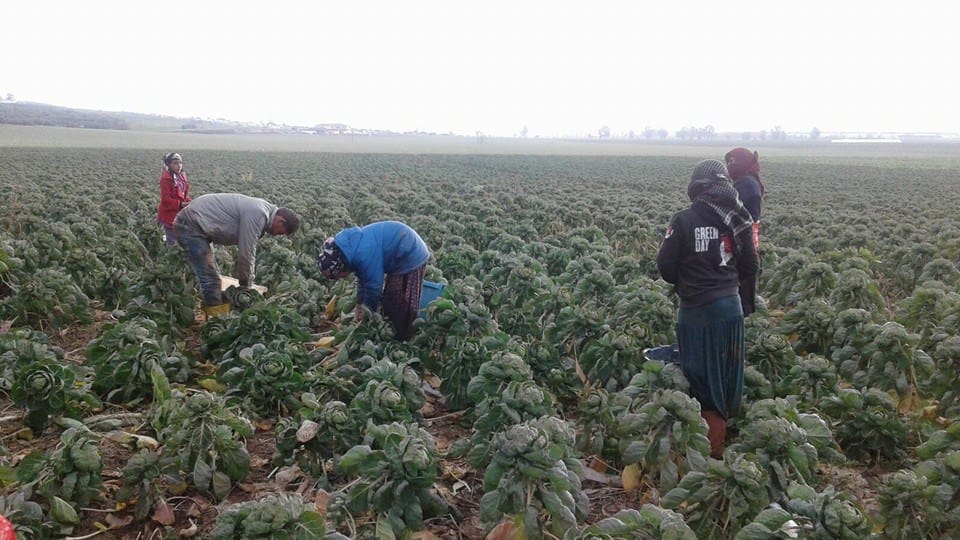The Kafala System: Ferocious Exploitation in Lebanon
Statement by Ta2mimalMasaref and Propaganda Lebanon
11 June 2020 (Arabic below)
More than fifty women were abandoned in front of the Ethiopian embassy under the blazing sun, in a deliberate process of desertion by their employers (sponsors) under whom they had worked for years. They were left stranded in front of the embassy without receiving due salaries and without being provided the bare minimum of food and health security.
The Lebanese authorities, represented by the ministry of labor, attempted to contain the situation by means of vain statements and flimsy promises, which did nothing to alleviate the humiliation these workers suffered. Non-governmental organizations (such as Caritas) are now rushing to enact administrative containment and confinement policies, by providing the workers with temporary shelter on the condition they be treated like prisoners: confiscating their phones, depriving them of their right to decide their own circumstantial fate, and accusing them of being thieves. The least that could be said about these acts is that they degrade and humiliate these persons as well as their status as workers. This is and has always been normalized by the application of the criminal Kafala laws under the racist Lebanese capitalist system.
Moreover, the policies of NGOs are part of an active suppression of workers’ struggles by abstracting these struggles away from their class aspect, which has a ripple effect on all workers under the Kafala system. This is why we see these organizations pushing for reductive and identitarian discourses that depict the crisis as exclusively affecting one “national community.” This process of fragmentation, under the banner of momentary and sporadic “humanitarianism” only aims to prevent any class solidarity between workers of all nationalities regardless of their legal status.
The NGO industrial complex’s sole purpose is to enable the regime’s reproduction. The Lebanese regime’s role during every economic crisis is to displace its effects onto the migrant workforce while the ensuing hardship is commodified in the NGO market in order to legitimize the impetus of capital. By these processes, collective struggles are uprooted from their base and opportunistically atomized and individualized by parasitic organizations that vie to monopolize exploitative markets that are adulated by fascistic regimes. It is in this context that the spectacle of exploitation is normalized and hegemonized, as institutions that claim to defend workers (like The General Confederation of Workers and The National Federation of Employees’ and Workers’ Unions) remain hollow and criminally silent about these heinous perpetrations.
Ever since the systemic crisis within the Lebanese capitalist regime amplified its contradictions—embodied by the fall of the local currency’s exchange rate—the regime has readily displaced the economic and financial crisis upon migrant and refugee workers. In other words, the most exploited sections of the working class were once again inflicted with the very crisis their labor has sustained for so long. The legal and militarized structural oppression that is endured by migrant workers (Palestinian, Syrian, Sudanese, Bangladeshi, Indians, etc.), which—in one example—enabled Ramco’s crackdown on a workers’ uprising in the waste management sector with the collaboration of the Lebanese security appratus, is yet another manifestation of the cruelty of the Kafala system.
The continuous displacement of the economic catastrophe upon migrant labor has now pushed migrant domestic workers to the brink. These acts are reminiscent of the United Nation’s policies of containment and trivialization that target Syrian and Sudanese workers; they are eerily similar to UNRWA’s irresponsible and unaccountable stance towards Palestinian workers; and they remind us of the politics of fragmentary relief that are adopted by various “humanitarian” organizations within refugee camps.
The urgency of the situation demands meeting the immediate basic needs of these migrant working-class women, who demand to:
- Be provided with dignified shelter that preserves their personal and political freedoms as workers
- Be provided with health and food security, and physical and psychological safety
- Be granted travel tickets paid by the Lebanese authorities or their respective sponsor as soon as possible
- Be paid all their wages in foreign currency or its equivalent. In this context, the Lebanese authority and sponsors (previous or current) bear all the responsibility.
However, their struggle is not confined to these demands. The Lebanese racist regime, its sponsorship system, all its beneficiaries—especially recruitment agencies—and every sponsor must provide compensation to all domestic workers who had to work under its humiliating and disgraceful exploitative provisions. In addition, we call for the prosecution of all those involved in the previous racist attacks and murders of domestic workers, and everyone involved in the process of displacement of these workers today. This includes—along with sponsors—the embassies of the countries concerned and the Lebanese security apparatus (mainly but not restricted to General Security) and associations that exploit immigration and labor issues.
The migrant labor force embodies a political dimension that will not fade with the repatriation of these workers. The Lebanese regime and the combined patterns of exploitation it enables through the sponsorship system will continue to oppress the remaining domestic workers, migrant workers, and refugees in all sectors of the economy. Normalization within the regime’s mechanisms, be it legal, institutional, non-governmental, and diplomatic—including South Asian, African, and Arab embassies—will not produce a satisfactory solution to this structural catastrophe. On the contrary, adopting the rules and procedures of the current regime will only allow it to reproduce and develop its oppressive, authoritarian networks and practices.
The time has come for a revolutionary grassroots organization that replaces civil society organizations and embassies pandering to the Lebanese regime’s racist policies. We must build a public safety net that transcends fragmented and sporadic individual aid initiatives. This fascist system will not stop the policy of silencing, ignoring, reducing, dismantling, and containing.
The Kafala sponsorship system will not wither away on its own unless we create an organization that ensures the process of monitoring, networking, and worker protection (of all kinds) among all migrant workers. This organization must aim to crystallize union formations through which the accumulated struggles of migrant and refugee workers intersect within the wider scope of class struggle, marching together hand in hand to reclaim and taking back by force what is righteously theirs, while paving the way for true liberation from the capitalism and racism that the existing Lebanese system brutally consecrates.
These are not foreign workers, these are the workers of this land and their dignity is our dignity. This is a worker’s revolution.
Lightly edited for clarity by Antidote
Featured image: “Hundreds of Ethiopian women placed on the floor of Beirut airport like merchandise.” Source: Twitter
The Fire These Times podcast has recently covered the issues of indentured migrant labor and violent racist social economy in interviews with grassroots activists in Beirut (Sami, Banchi Yimer, and Daryn Howland) and an Ethiopian journalist (Zecharias Zelalem). The show notes to the episodes linked here contain lists of further readings and resources.
One domestic worker suicide is reported per week in Lebanon. It is very hard to say what proportion of such deaths go unreported, or what proportion are actually lynchings. One recent suspicious case was the death of Faustina Tay, a Ghanaian domestic worker in Beirut, in March of this year.

تشريد العاملات المهاجرات يفضح قبح الاستغلال المركب في لبنان
أكثر من خمسين امرأة تُركن تحت وهج الشمس أمام السفارة الاثيوبية، في عمليّة تشريد متعمّد من قبل العوائل التي عملن عندهم لسنوات، دون أن يُدفع لهن معظمهن أجورهن المستحقّة، أو يوفّر لهن أدنى مقومات الأمن الصحي والغذائي.
حاولت السلطة اللبنانية ممثلة بوزارة العمل احتواء الموقف، ببيانات فارغة ووعود واهية لم تستطع أن تكف عن العاملات ضيم المذلة والاستغلال . الآن تسارع منظمات ومؤسسات “خيريّة” إلى ترجمة سياسات الإحتواء والعزل الوزارية، من خلال منح العاملات مأوى مؤقّت مقابل معاملتهم كسجينات: مصادرة هواتفهن وممتلكاتهن، ومصادرة حقهن في تقرير مصيرهن الظرفي، واتهامهن بأنهن لصوص). أقل ما يُقال في تلك الأفعال أنها استخفاف وتحقير لشخصهنّ ولهويتهنّ العُمالية، وهو ما تم ويتم تطبيعه عن طريق استمرار أحكام نظام الكفالة المجرم في ظل الرأسمالية العنصرية اللبنانية.
وأكثر من ذلك، تأتي سياسات المنظمات غير الحكومية بالمجمل في سياق تمييع لقضيّة العاملات، وتجريدها من سياقها العمالي الذي يمسّ كل العاملات والعاملين تحت نير نظام الكفالة. لذا نرى المنظمات تُركز على سياق اختزالي هوياتي، لتتحول الأزمة من أزمة تمس النساء على أنهنّ عاملات، إلى أزمة تقتصر على “جالية قومية” معيّنة. وهكذا تكون العملية التفتيتية بعناوين “إنسانوية” لحظوية، تتمثل بالحؤول دون التضامن الطبقي بين العاملات والعمال من كل الجنسيات والوضعيات القانونية.
فإن كانت هذه المنظمات تخدم أحدا، فهي مصلحة السلطات البرجوازية اللبنانية التي اعتادت تصدير أزماتها من خلال تسليع المآسي والمعاناة في سوق المنظمات غير الحكومية، لتشرعن الحركة الاستنسابية والمتبعثرة لرأس المال المالي. وهكذا تتحوّل القضايا الجماعية إلى قضايا فرديّة /فئويّة، تنتهزها جهات متمولة لتحافظ على مواقعها الاحتكارية ضمن أسواق الاستغلال – الأسواق التي تهندسها ثقافة النظام الفاشويّة. هكذا تُطبَّع مشهديّة الاستغلال واستمراريتها في أذهان الشعوب. ولكن بين هذا وذاك، لا يمكننا أن نغفل عن الصّمت القاتل الذي يَغرق به من يدّعي حماية العمال – الإتحاد العمالي العام والاتحاد الوطني لنقابات العمال والمستخدمين على حدّ سواء.
منذ أن استفحلت حلقات الأزمة الاقتصادية البنيوية التي ضربت النظام اللبناني الرأسمالي، وتمثّلت بهبوط حاد لقيمة العملة اللبنانية مقابل الدولار، شرع النظام ببنيته العنصريّة إلى ازاحة أكلاف الأزمة على العمال المهاجرين واللاجئين، أي الطبقة العاملة الأكثر عُرضةً للاستغلال، ضمن البنيان الإجتماعي والقانوني اللبناني. رأينا ذلك في عمليّة التضييق القانونية والأمنية التي يواجهها العمال – اللاجئون (فلسطينيين وسوريين وسودانيين وبغلادشيين وهنود وغيرهم…)، وبعدها رأيناها في قطاع النظافة، حيث قمعت شركة رامكو بمؤازرة الأجهزة الأمنية اللبنانية، الانتفاضة العمالية فيها. والآن تستمر الحرب الإقتصادية والاجتماعية على عاملات المنازل دافعة بهن جماعةً الى حافة الهاوية. كما تذكرنا هذه المشاهد بأنماط الاحتواء والتمييع التي تتبعها الأمم المتحدة بحق العمال السوريين والسودانيين، وسياسات الأونروا الاحتوائية تجاه اللاجئين الفلسطينيين، وعمليات التفرقة الإغاثية التي تقوم بها المنظمات “الإنسانية” في مخيمات لبنان ومدنها الافقر.
ان فداحة الوضع الراهن يتطلب تأمين حاجات النساء العاملات الأولية:
• تأمين المأوى الذي يحفظ لهن حرياتهن الشخصية والسياسية كعاملات
• العمل على حماية أمنهن الصحي والغذائي وسلامتهن الجسدية والنفسية
• تأمين تذاكر سفرهن من السلطات اللبنانية أو الكفيل في أسرع وقت ممكن
• تسديد كافة أجورهن بالعملة الأجنبية أو ما يعادلها. يتحمل المسؤولية في هذا السياق السلطة اللبنانية وأصحاب الكفالة (السابقة أو الجارية).
ومع ذلك لا تقف قضيتهنّ عند هذا الحدّ، فالنظام اللبناني ونظام كفالته وكل المستفيدين منه خاصّة مكاتب الإستقدام، وكل صاحب كفالة لا بد وأن يقدّم تعويضات للعمال والعاملات، اللواتي اضطررن الى العمل تحت أحكامه الاستغلالية المذلّة والمشينة. كما أنه لا مفرّ من ملاحقة وعقاب كل ضالع في ما سبق من عمليّات اعتداء وقتل للعاملات، وكل ضالع في عملية تشريد هؤلاء العاملات اليوم. يتخلل ذلك – إلى جانب أصحاب الكفالة– الجهات الأمنية اللبنانية المعنية والجمعيات المُستغلة لقضايا الهجرة والعُمّال وسفارات البلدان المعنية.
ان لهذه الأزمة العمالية بُعدها السياسي الذي لن يتلاشى مع سفر هؤلاء العاملات. فالنظام اللبناني وانماط استغلاله المركب سيستمر في القمع والاعتداء على ما تبقى من عاملات المنازل والعمال المهاجرين واللاجئين ضمن كافة القطاعات. وإن التطبيع مع آليات النظام وبنيته القانونية والمؤسسية وقنواته الدبلوماسية بما فيها السفارات الآسيوية والإفريقية والعربية ووكلاء الانظمة من المجتمع المدني، لا يمكن أن يُنتج حلا فعليا لهذه الفاجعة البنيوية. بل على العكس من ذلك، ان تبنينا واكتفائنا بقواعد وإجراءات النظام الحالي، سيمنحه القدرة على اعادة انتاج وتطوير شبكاته وممارساته وسياساته القمعية الاستبدادية.
حان الوقت لعمليّة تنظيم شعبي قاعدي شامل، تحل مكان تلك النُظم المؤسساتية من منظمات وسفارات التي تتماهى ضمنًا مع سياسات النظام اللبناني. علينا أن نبني شبكة أمان شعبي، تتعدى المساعدات الفردية المشرذمة. لن يكف هذا النظام الفاشي عن سياسة الإسكات والتجاهل والإختزال والتفكيك والإحتواء، ولن يزول نظام الكفالة ما لم ننشء تنظيما يكفل عملية الرقابة والتشبيك والحماية (على أنواعها ). لا بد لهذا التنظيم ان يهدف الى بلورة تشكيلة نقابية تتقاطع بها قضايا الطبقة العاملة المهاجرة واللاجئة، بحيث تتكاتف القوى نحو مسيرة نقابية، تنتزع حقوق العمال مُعبدةً الطريق الى التحرر من الرأسمالية والعنصرية التي يقتات عليها النظام اللبناني القائم وسلوكياته المتوحشة.
هؤلاء ليسوا بعمال أجانب، هؤلاء عمال هذه الأرض وكرامتهم من كرامتها. الثورة للعمال.


